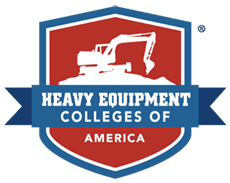Heavy Equipment Training FAQs
If you’re considering a career in heavy equipment operation, you may have some questions before choosing the right heavy equipment training school. We’ve collected your frequently asked heavy equipment training questions in one place so you can discover if a career in heavy equipment operation is for you.
Heavy equipment training prepares you for a career in the construction industry by teaching you the skills required for success in your chosen field. The programs at HEC provide hands-on and textbook instruction to help students become effective and safe workers. Learn more about heavy equipment training with our list of frequently asked questions.
Heavy equipment operators are vital parts of construction sites. In addition to operating the machinery, operators maintain them so the jobs continue to run smoothly. From building roads and bridges to constructing buildings, operators maneuver and control the equipment that transforms our landscape and shapes our society.
Skills necessary for heavy equipment jobs can vary depending on the type of machine and job site, but if you possess these skills you will find you will flourish in this role.
– Quick decision making
– Attention to detail
– Team player
– Critical thinking skills
– Hand and foot coordination
– Physically able to work in strenuous conditions
– Good written and verbal communication
Lay the groundwork for a successful career with heavy equipment training from an accredited school. At HEC, students can gain textbook knowledge while getting hands-on experience in their field from expert instructors. Programs include:
Certificate of Heavy Equipment Operations — Level I
Build the foundation of your career with the basics of heavy equipment operation. Essential skills covered include digging, trenching, earthmoving, loading, safety procedures, and construction site fundamentals.
Certificate of Heavy Equipment Operations — Level II
This course builds on the fundamentals learned in Level I. Receive training and experience to help you with more complex heavy equipment operator roles.
Certificate of Heavy Equipment Operations — Mobile Crane
Learn the fundamentals of crane operation such as set up, lift planning, rigging, signaling, and load dynamics.
Certificate of Heavy Equipment Operations — Lattice Boom Crawler Crane
A follow up to the Certificate of Heavy Equipment Operations — Mobile Crane course, master the basics of lattice boom crane operation.
Associate of Occupational Science in Heavy Equipment (AOS)
Learn advanced industry skills to grow within the construction industry and advance your career.
Heavy equipment operators quite literally build our collective future. Without licensed and certified operators, roads could not be built. Buildings would not be constructed. Cities could not grow. Heavy equipment operators work in a variety of industries, from construction and mining to waste disposal.
The U.S. Bureau of Labor Statistics projects that equipment operators will see five percent growth between 2020 and 2030, with about 51,500 job openings each year.
The most recent median pay statistics from the U.S. Bureau of Labor Statistics lists heavy equipment operators earning $23.61 per hour or $49,100 per year.

Find the Right Heavy Equipment School Near You
You’ve read our heavy equipment operator training FAQs and now you’re ready to take the first step in launching your new career. You need a school that centers education around your needs, offers valuable instruction, affordable tuition, and accelerated learning options.
HEC offers four locations across the country so you can find the one that best meets your needs. Take the first step and launch a career that is both rewarding and fulfilling.
HEC-FAQ-Infographic
